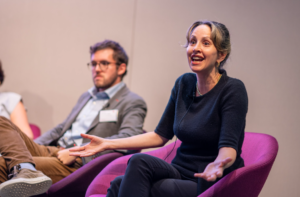Guest post from Georgia, trainee solicitor and legal adviser.
As a very new member to the Protect team, the 30th anniversary conference on the 5th of October came at a perfect time, giving me a great introduction to the work of the charity and the opportunity to meet a whole host of journalists, lawyers, politicians and whistleblowers themselves. After spending hours unsuccessfully trying to cram all of the takeaways into a snappy blog, I’ve settled on sharing my top five memorable moments:
1.The ongoing threat of NDAs
The unsettling account of Zelda Perkin’s experience when it came to the use of an NDA to silence her from speaking up against Harvey Weinstein.
“I thought I would end up in prison because I wasn’t able to stick to the agreement in my NDA – an NDA that said I couldn’t speak to the police, I couldn’t have a therapist, and one that I was never allowed to hold.”
Poignantly put by Sybille Raphael, Protect’s Legal Director, settlement agreements with NDAs have allowed wrongdoers with deep pockets to operate with impunity for decades in a system where their victims were silenced one by one.
2.Environmental hazards
Listening to environmental whistleblower Desiree Fixler recount her gripping story of what led to her blowing the whistle on former employer DWS for alleged greenwashing and the acts of retaliation that followed – “they thought that if they crushed me, it would be the end of it”.
As the spotlight on environmental obligations continues to get stronger, Desiree called her story a “cautionary tale” to large organisations, warning that we can now “put a big fat cost on greenwashing”.
3.Time to re-write the story
When considering why #MeToo has changed the way we work, film director Tas Brooker explained that the position “is black and white, but there is this grey line pushing whistleblowers not to tell tales”.
As much as we look to organisations to lead by example and actively encourage a speak-up culture within their workforce, everyone has a personal responsibility to change the narrative when it comes to whistleblowing.
4.Gen Z not afraid to speak up
94% of participating online attendees answered “Yes”, when asked “In your view, is Gen Z more likely to whistleblow than older generations?”
Although this came as no surprise to me, it was really interesting to hear the panel discuss why future generations are less likely to stand for toxic workplaces, and how their perception on what constitutes wrongdoing is impacted by their own behaviours and values.
5.Ready for a SLAPP down
Charlie Holt, Co-chair of the UK Anti-SLAPP Coalition, reassuring us that “the UK is leading the way on anti-slapp action as it prepares to pass into law the first anti-slap legislation in Europe”.
SLAPPs prevent public scrutiny of suspected wrongdoing, suppress free speech and are a barrier to accountability, so I am eager to see how far the Economic Crime and Corporate Transparency Bill goes in putting the power back into the hands of the whistleblower.





